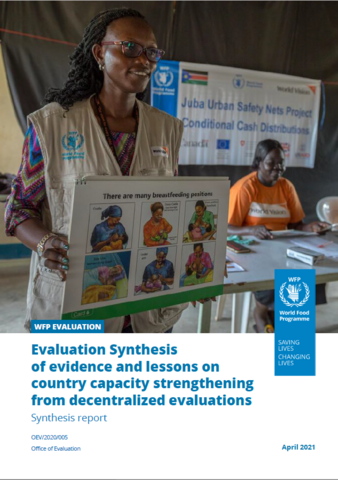
The objectives were to: i) draw lessons from evaluations on CSS; ii) assess WFP performance and results of CCS interventions; iii) identify common themes and systemic issues relating to the design and implementation of CCS interventions; and, iv) provide insights for country offices designing CCS interventions in Country Strategic Plans.
The synthesis affirmed the importance of CCS to the achievement of WFP’s objectives, particularly in supporting countries to strengthen their capacities in food security and nutrition. The evaluations provide indications of long-term positive capacity change as a result of CCS interventions. However, WFP uneven monitoring and under-reporting of CCS achievements affects its ability to identify and showcase results and strengthen its own learning.
The synthesis identified several lessons aimed at strengthening WFP's engagement with state and non-state actors: (i) systems for CCS knowledge management and performance measurement are needed to enable continual improvement; (ii) conducting capacity needs assessments or utilizing existing data at the design phase could increase the scope and usefulness of CCS interventions; (iii) combining advocacy with technical advice that is aligned with national government frameworks for transformative change; (iv) synergies between CCS across all three domains; (v) collaborating with partners, including other United Nations agencies, and establishing (where appropriate) clear transition plans and agreements prior to transition help to sustain results.
The synthesis made five recommendations.
